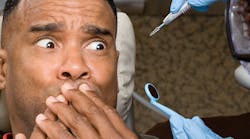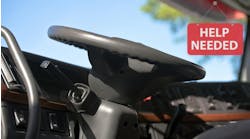Imagine visiting the dentist for what you think is a quick pain fix and ending up in a hospital emergency room?
Dr. Thomas Roemer, the dentist at the Iowa 80 Truckstop, has seen it too many times. His practice is 95% emergency, drop-in care, but too often it's beyond any dental intervention.
"My biggest advice to truck drivers is to keep themselves out of a medical emergency by making sure a dental problem doesn't turn into a medical problem…I'm not here to say to [most of my patients], 'Hey, you need to get your teeth cleaned and examined.' We're beyond that. It's a situation where they have to get some kind of care to try to stay out the medical emergency room. I know I keep saying 'medical, but there's a handful of guys over the years I've sent to the hospital because I can't even treat them. It's actually that bad and I've said: 'You really need to go admit yourself to the hospital.'”
He adds: "When there's an infection that goes down [a face] or below their collarbone or one that goes up into their eye and it's really bad and one of their eyes is swollen shut and they can't really see or drive, these will turn into blood-borne infections then that's a life-or-death situation. And, again, it doesn't happen all the time. But we see enough patients that they might come in just in the nick of time."
Roemer, who had his office in the nearby town of Walcott, IA, bought a Yellow Pages ad in the early 1990s. When drivers at the truck stop would look up dentists in the area, he was the first one listed. "Over the years, since we got so many calls, I decided to set up shop here [at the truck stop] part-time. I was only here a day and a half a week for the first 10 years. After ten years, we made it full-time, and I've been out here full time ever since."
One of the problems that would-be patients face is pushback from their companies if they feel they have to stop for dental attention. "I have company drivers whose boss will not let them stop and see me, and even if they do, they say they don't have enough time. I tell them to tell their boss: 'Listen, if I don't get help, I'm going to end up in the hospital and I won't be making any money for the company at all.' They should tell their boss that he better lighten up a little and let them care for their dental health or it's going to get extremely worse."
Most dental emergencies from drivers include abscessed teeth, broken teeth, decayed teeth, and broken dentures.
"It's a lot of pain management," says Roemer. "Many drivers wait until there's a level of pain that's just too much to handle with over-the-counter medications. Pain is a big driver of my business. If I see nine or 10 guys in a day, five to eight of them are experiencing some kind of discomfort." Mainly, Roemer says, he tries to get the drivers taken care of and back on the road until they can see their regular dentist and get their issues addressed.
Roemer notes that drivers' overall health affects their dental health. For example, many people with sleep apnea breathe through their mouths. "If you get dry mouth syndrome or if you're diabetic, your healing is definitely inhibited."
Bret Tucker, a dentist whose office is in Sapp Bros. Travel Center in Omaha, NE, agrees that drivers' overall health conditions such as diabetes, obesity, sleep apnea and hypertension can impact dental health. "Driver dental health varies just like the regular population. But most of them have worse health because they can't get in anywhere [a dentist office] and their overall health is not good. And, [dental health] is not a priority for them. Drivers get a lot more periodontal gum disease. And with their diabetes, being overweight, the bad food they eat and poor hygiene, their dental health is worse."
Tucker says: "Diabetes causes bone disease and gum disease and loosening of teeth. Just like everywhere else in the body, as circulation decreases, it hurts kidneys, eyes, feet, and it's the same in the mouth. [Diabetics] get a lot more abscesses, and infection are harder to cure."
Smoking, he notes, is the number one cause of periodontal bone disease. "Back when I went to school, they thought it was a contributing top-five factor, but smoking is the number-one cause of periodontal bond disease. Smoking cuts down circulation, and that cuts down healing."
Unlike Roemer, Tucker sees more of the same patients on a regular basis. So much so that he has established a payment option. "As you may know, five of the larger trucking companies are in Salt Lake, and we're trying to get either companies or individuals to sign up. It works like insurance except they have to come here; that's the only drawback. For $240 a year for an individual, $360 for a couple or $480 for a family for the whole year they get a free exam, cleaning, and x-rays, and then everything else is half-off. It's a hell of a deal," he says.
Roemer adds that although his practice is driven by walk-ins, he implores drivers to call ahead. "The worst scenario is if we leave at 3:30 and a driver in pain pulls in at 4 p.m. If he had called us from several hundred miles away, we would have stayed. Not that we don’t turn around sometimes, but calling ahead first is beneficial for both the drivers and me. If they don't have my number, they can always call the Iowa 80 Truckstop."




